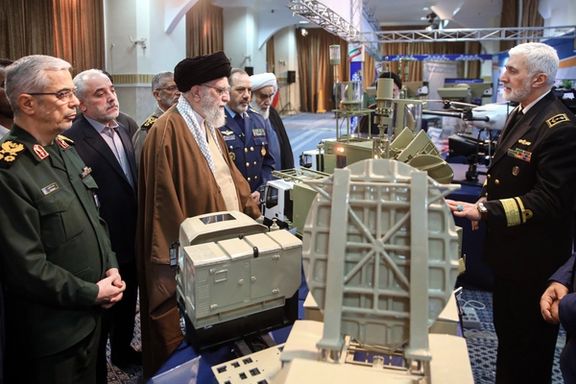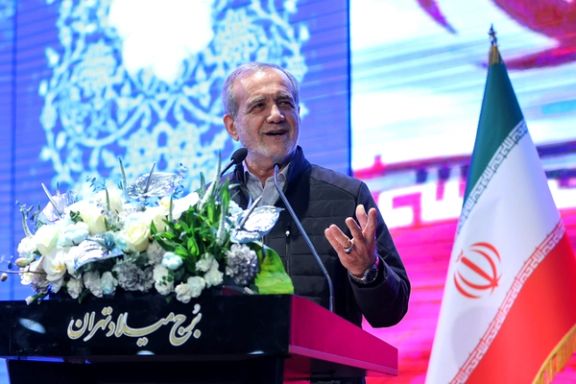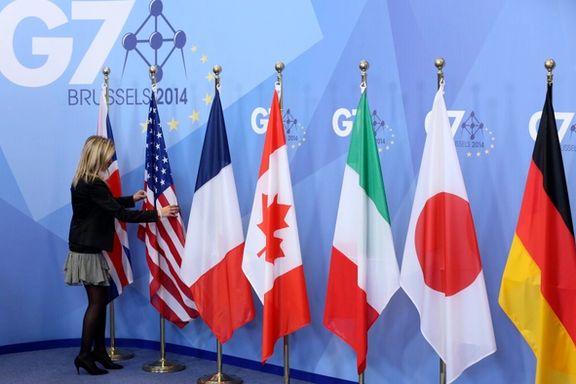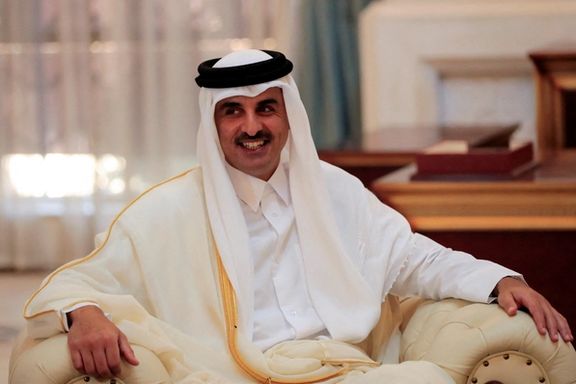205 matchmaking websites licensed in Iran amid declining marriage rates

The Iranian government has licensed 205 matchmaking websites in a bid to boost declining marriage rates among young Iranians, according to ILNA news agency.

The Iranian government has licensed 205 matchmaking websites in a bid to boost declining marriage rates among young Iranians, according to ILNA news agency.
"The government will be accountable for any problems these centers may cause," said Alireza Rahimi, Deputy Minister of Sports and Youth Affairs. He added that an expert group has been formed to evaluate the effectiveness of these websites in increasing marriage rates.
While Rahimi acknowledged what he called “some abuses" at these centers, he did not elaborate on the details of possible problems and oversight mechanisms. He added that the police are responsible for dealing with unlicensed matchmaking services.
The move comes as Iran faces a declining marriage rate and rising divorce rate. Government efforts to encourage higher birth rates have failed to produce results, according to data from the National Organization for Civil Registration.
According to the latest data from Iran's Civil Registration Organization, nearly 39% of marriages in the first seven months of the Iranian year 1403 (March to September 2024) ended in divorce. Data from the Statistical Center of Iran also reveals a 46% decrease in marriages between 2010 and 2023.
Economic hardship, rising awareness of individual and family rights, and access to legal and counseling services are among the factors contributing to young people's reluctance to marry.
In January, Iran's Science Ministry announced it is removing educational content discouraging childbearing and offering new incentives to boost declining fertility rates. These include more married student dorms, on-campus kindergartens, and increased financial aid for housing, loans, and other benefits for married students with children.

Supreme Leader Ali Khamenei said on Monday that Iran could fend off an attack by its enemies, days after US newspapers reported Israel was considering strikes this year on Iran’s nuclear sites.
“Today, in terms of strong defense and confronting hard threats from the enemy, we have no worries or problems. Our capability to counter hard threats is at an excellent level, and for that reason, the people feel secure,” he said.
The Wall Street Journal and The Washington Post reported last week citing US intelligence assessments from last month that Israel saw an opening for an attack on Iranian nuclear sites as early as the first of this year.
Israel is basing its assessment, the papers reported, on Iran's weakness after an Oct. 26 Israeli attack knocked out much of its air defenses and a greater perceived receptiveness to military action from US President Donald Trump.
Khamenei did not directly address the idea of an Israeli attack or potential talks between Iran and the US following the restoration of President Donald Trump's "maximum pressure" campaign.
Earlier this month, while announcing a hasher sanctions policy on Tehran, Trump also signaled a willingness to negotiate a deal with Iran—a proposal that Khamenei has publicly rejected.
His speech in the city of Tabriz, delivered during the month-long commemoration of the Islamic Republic’s 46th anniversary, was claimed by state-run broadcasters to have drawn thousands, although this figure could not be independently verified.
“The Islamic Revolution has managed to preserve itself as an independent identity and as a vast, hopeful base for the peoples of the region and even beyond. The reason for the anger of arrogant and colonialist forces around the world towards the Islamic Republic is the steadfastness and resistance of the Iranian nation in confronting them,” Khamenei told the gathering.
Relative moderate President Masoud Pezeshkian, who was also in attendance, recently backed Khamenei’s opposition to dialogue with the US. Iran’s Supreme Leader is the ultimate decision-maker on foreign and domestic policy.
Since Trump’s announcement, Iranian hardliners have steadfastly resisted any talks, while a few voices have pushed for easing the stance to relieve economic pressure by lifting sanctions.
Over the past year, Israel’s repeated military operations targeting Iranian-backed militant proxies in Gaza, Lebanon, and Syria have significantly eroded Tehran’s regional influence. With the fall of Assad’s government—once a critical ally—these external pressures have left Iran in what analysts describe as its most fragile state.
Talks with Washington now appear distant as US-led sanctions deepen hardship and discontent for Iranians grappling with a worsening economy.

Days after the 46th anniversary of the 1979 Islamic Revolution, media in Tehran are sounding the alarm over deep flaws in the governing system and a worsening economic crisis, warning that the Islamic Republic's survival is increasingly at risk.
A leading article in the Jomhouri Eslami newspaper, a conservative outlet owned by Supreme Leader Khamenei's office, noted last week that 46 years after its establishment, the Islamic Republic has yet to restore justice in Iranian society. "The people are still suffering from injustice and discrimination," the daily wrote.
The article also criticized the governing system for undermining the independence and freedom it has long promoted. Highlighting "the divide between the people and the ruling clerics," the newspaper stressed that "the people should be the driving force and focal point in the Islamic Republic" and posed a pointed question: "What is the people's role and status in the government?"
Although Iran holds regular elections, political parties and the media face severe restrictions, and only approved candidates are allowed to run.
Jomhouri Eslami also criticized the stark contrast between officials leading lavish lifestyles—driving luxury cars under tight security to pay respects at the mausoleum of the Islamic Republic's founder—and ordinary people who struggle to reach them to voice their concerns.
The daily criticized the disparity between officials and the public, noting that officials earn several times more than ordinary citizens and enjoy government-funded travel and luxury while advocating austerity. The daily warned that such a lifestyle and governance approach could undermine the political system's stability.
Meanwhile, the pro-reform website Fararu warned, "A catastrophe is on its way as half of the population in Iran is getting poorer on a day-to-day basis."
It cautioned that the situation is becoming increasingly dire, particularly for low-income groups, due to rising inflation, soaring exchange rates, price fluctuations, and ongoing economic crises. The website argued that many Iranians are struggling to make ends meet amid the financial turmoil.
"At the same time, all initiatives aimed at improving the situation have failed and remained futile. This has caused a general dissatisfaction among the public and has led to serious questions about the government's ability to tackle the current crisis," the website wrote.
Fararu cited market expert Hamid Haj Esmaili, who attributed the worsening economic situation over the past two decades not only to sanctions but also to government inefficiency in resource distribution, which has exacerbated the crisis.
Haj Esmaili noted that nearly half of Iran's population relies on government support to survive, while the government must take stronger action against corruption. He emphasized that these challenges are all linked, in some way, to the impact of sanctions and urged authorities to engage with other countries to address the crisis.
Meanwhile, the pro-reform daily Setareh Sobh published a commentary last week by former lawmaker Yadollah Eslami, who highlighted "the wide gap between the people and the government." He argued that "the officials' indifference to people's increasing problems has made many people distance themselves from the government."
Eslami also criticized officials "for the arrogance in their rhetoric when they address the nation," describing their tone as "a mixture of insult and violence." He warned that "unfortunately, some Iranian officials believe that insults and violence are a virtue for them; and in this situation, what is being sacrificed is truth, justice, and freedom."

Iranian President Masoud Pezeshkian says the Islamic Republic does not seek conflict but faces external pressures from countries he accuses of fueling instability.
“We are not seeking war… We seek peace and tranquility,” Pezeshkian said Monday, according to semi-official ISNA news agency.
He criticized Western nations for what he called hypocrisy in their human rights advocacy, referencing the civilian death toll in Gaza.
“They massacred more than 18,000 young people and buried 20,000 women under the rubble, yet they claim to champion human rights,” he said.
Elsewhere in his remarks Pezeshkian hailed the role of science in addressing Iran’s challenges, urging reliance on scholars and elites. “There are many paths, but our solution lies in science,” he noted.
He also warned that domestic divisions fuel external hostility, saying, “Unnecessary conflicts encourage the greed of our enemies.”
The president’s remarks come amid international sanctions on Iran over its nuclear program, its support for Russia’s war in Ukraine, and its backing of armed groups across the Middle East.
It also comes after a statement from the G7 at the Munich Security Conference blamed Tehran for being the cause for regional instability.
“The G7 members unequivocally condemned Iran’s destabilizing actions, including its rapid advancement of uranium enrichment without credible civil justification, its facilitation of terrorism organizations and armed groups across the Middle East and Red Sea, its proliferation of ballistic missiles and drones, and its transnational repression and violation of fundamental human rights,” read the statement issued on Saturday.
Pezeshkian previously echoed similar calls for peace during a visit to Tajikistan last month, but has rejected nuclear negotiations with the United States in accordance with a directive by Supreme Leader Ali Khamenei.

Iran rejected the latest G7 statement that criticized Tehran's ongoing nuclear activities and support of regional militant groups.
“The G7 members unequivocally condemned Iran’s destabilizing actions, including its rapid advancement of uranium enrichment without credible civil justification, its facilitation of terrorism organizations and armed groups across the Middle East and Red Sea, its proliferation of ballistic missiles and drones, and its transnational repression and violation of fundamental human rights,” read the statement issued on Saturday.
The G7 ministers held a meeting on the sideline of the Munich Security Conference.
Foreign Ministry Spokesman Esmail Baghaei on Monday and during his weekly briefing rejected the statement as politically motivated, arguing that Western powers themselves were responsible for fueling instability.
“The return of stability and security to West Asia requires these countries to stop their interventionist policies in regional affairs,” he said, referring to the United States, Canada, and three European members of the G7.
Iran pushes back on military, nuclear criticism
In response to criticism concerning the military capabilities of Iran, Baghaei said that Iran’s defense facilities follow all prevailing international laws.
“Iran’s military and defense advancements are necessary for national security and contribute to stability in West Asia,” he added.
Over the nuclear issue he dismissed concerns raised over enrichment of uranium as being politically driven.
“Our peaceful nuclear activities are fully in line with the Non-Proliferation Treaty and international safeguards,” he said, adding that Iran would continue its program based on its technical and industrial needs.
Baghaei accused the G7 of ignoring Israel’s nuclear capabilities. “The biggest obstacle to a nuclear-free Middle East is the Zionist regime, which has stockpiled weapons of mass destruction while enjoying full support from the same G7 countries,” he said.
Diplomatic outreach continues despite tensions
Despite Western pressure, Baghaei highlighted Iran’s ongoing diplomatic efforts, pointing to high-level meetings in Oman by Foreign Minister Abbas Araghchi. “These engagements are part of a broader strategy to enhance economic and political cooperation,” he noted.
On restrictions faced by Iranian flights to Beirut, he said discussions are underway with Lebanese officials. “We will not allow external forces to disrupt the strong historical ties between Iran and Lebanon,” he said.
Last week two flights from Tehran were banned from landing in Lebanon's only international airport.
On Friday, the second flight banned from taking off from Iran triggered protests in Lebanon from supporters of the Iran-backed group who blocked the road to the airport. The Lebanese army fired tear gas at protesters.
Responding to Israeli threats, Hezbollah funeral plans
Baghaei also addressed Israeli Prime Minister Benjamin Netanyahu's recent comments on a possible attack on Iran.
“Such statements are a blatant violation of international law, and those who issue these threats should be held accountable,” he said.
Israel's Prime Minister Benjamin Netanyahu expressed his intention on Sunday "to finish the job against Iran" with the support of US President Donald Trump.
Regarding Iran’s involvement in the funeral of the assassinated Hezbollah Secretary-General Hassan Nasrallah, killed by Israel last year, Baghaei said Tehran will be participating at a high level.

The emir of Qatar Tamim bin Hamad Al-Thani will visit Tehran in coming days, the Hezbollah-affilaited Al-Mayadeen News reported, a couple of weeks after Doha expressed preparedness to mediate talks between Iran and the United States.
Iran's former ambassador to Doha Hamid Dehghani on Sunday described the emir's visit as "very important".
"The visit of Sheikh Tamim bin Hamad Al Thani to Tehran at this stage, and his discussions with our country's officials regarding bilateral relations, regional and global developments, especially consultations on the issue of Palestine, are considered highly significant," Dehghani said in a post on his X account.
On February 5, the Qatari foreign ministry spokesman told Fox News the Arab country was prepared to serve as a mediator between Tehran and Washington in settling the crisis over Iran's disputed nuclear program, as it did in the past.
“It is through mediation and through the negotiations that we have done this in the past,” Majed Al-Ansari said. “And we had been even during the first Trump administration working with the administration over getting an arrangement with Iran."
“We are hopeful that we can be instrumental for the United States with this,” the diplomat added.
On Sunday, US National Security Advisor Mike Waltz said President Donald Trump is willing to engage in talks with Iran only on condition that Tehran fully abandon its nuclear program.
"The President has also expressed a willingness to take whatever action is necessary. All options are on the table," Waltz told Fox News on Sunday, leaving the option of diplomatic channels open.
Trump's state secretary Marco Rubio told CBS later in the day that the US administration does not "have any outreach from Iran."
"Ideally, yeah, I would love to wake up one day and hear the news that Iran has decided not to pursue a nuclear weapon, not to sponsor terrorism, and re-engage in the world as a normal government. We've had no indication of any of that, not just now, but for 30 years," he said.